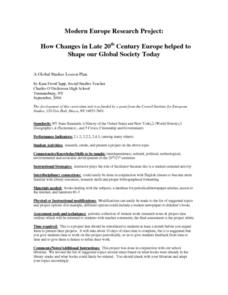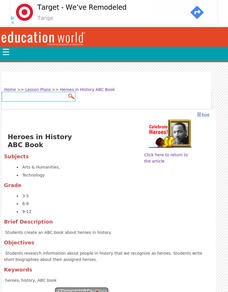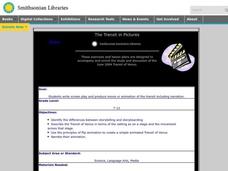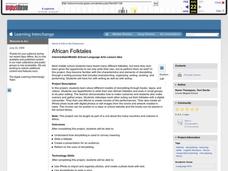Curated OER
Remains of the Day
Learners consider how archaeologists discovered and pieced together artifacts that indicate a Celtic presence in ancient Turkey. They research ancient civilizations and create archaeological digs containing items representative of these...
Curated OER
Battery Power
Sixth graders examine how much energy they use in the form of battery power. They examine the cost of using regular vs. rechargeable batteries and examine the effect on the environment of the two types of batteries. They discover that...
Curated OER
Modern Europe Research Project: How Changes in Late 20th Century Europe Helped To Shape Our Global Society Today
Students research a topic relevant to the late 20th century. They create a project while following the conditions explained in the rubric.
Curated OER
Paws in Jobland: Aspects of Working Life
Students discover concepts related to working conditions and practices. In this career lesson plan, students research information pertaining to specific jobs and then present it to their peers.
Curated OER
Conquistadors: Inca Rebellion
Students explore the Incan culture. In this Incan history lesson, students research the rebellions that occured upon the arrival of the Spanish conquistdors. Students write essays regarding the rebellions and whether or not they could...
Curated OER
Native Americans in Arkansas: The Quapaw
The Quapaw Indians of Arkansas are the focus of this American history lesson. Learners discover many aspects of the Quapaw culture, such as their dwellings, social organization, food, and how the tribe was eventually driven out of...
Curated OER
Figure of Speech
Examine the changing nature of language in the U.S. View and discuss excerpts from a PBS documentary with your class and then conduct Internet research, and complete a team project on the evolution of teen expressions.
National Endowment for the Humanities
Not 'Indians,' Many Tribes: Native American Diversity
Students explore what they thought they knew about "Indians." They examine the Hopi, Abeneki and Kwatiutl tribes in a game-like activity using archival documents.
IBM
What Path Will You Follow?
"What do you want to be when you grow up?" is a question every kid has to answer quite often. Here is a instructional activity that will allow them to do some thinking about that very topic, and to learn about some professions they might...
Humanities Texas
Primary Source Worksheet: Udo J. Keppler, “Next!”
Standard Oil's stranglehold on the US government is the subject of a 1904 political cartoon. Kids use the questions on the provided instructional activity to prompt their analysis of this primary source.
Curated OER
Note-Taking: K.I.S.S. "Keep It Short and Simple"
Note-taking is an essential study skill, and it needs to be taught! In the context of a research project on energy sources, learners find multiple sources, evaluating, paraphrasing, and citing them correctly. Two lists with note-taking...
Curated OER
Heroes in History - ABC Book
Youngsters research information about people in history that we recognize as heroes. They write short biographies about their assigned heroes, and create an ABC book. This is an ambitious project becausev26 people must be chosen and...
Library of Congress
The Conservation Movement at a Crossroads: The Hetch Hetchy Controversy
Should wilderness areas be preserved or managed? Class members examine primary source documents, including lecture notes, articles, essays and congressional records to better understand the Hetch Hetchy controversy that created a split...
Curated OER
The Animals Kingdom
Students are introduced to the classification system of animals. In groups, they set up an aquarium in which they must maintain throughout the year. They also observe earthworms and how they react to various stimuli and research the...
Curated OER
What Makes Our Community Special?
Explore websites, complete research, and use technological tools to create a final multimedia presentation on what makes a community special. Learners of all ages work with a partner to research an interesting aspect of their community,...
Curated OER
Masks
Students examine traditional masks from Southwest Indian groups and create their own mask based on Internet research. They share their mask with the members of their class.
Curated OER
Exploring Geometry on the Sphere
In this geometry worksheet, students define important vocabulary dealing with circles. They measure cricles to the nearest degree. There are 11 word problems to be solved.
Curated OER
Genetic Disorders
Students examine how living cells create new cells and how genetic mutations can cause disorders and be inherited. In this genetic reproductionn lesson students create their own PowerPoint presentation.
Curated OER
The Transit in Pictures
Students investigate the June 2004 Transit of Venus, write a screen play, and produce a movie or animation of the transit including a narration. The difference between storytelling and storyboarding is made clear in this lesson plan.
Curated OER
Rejoice, It’s National Poetry Month!
Cultivate an interest and enjoyment of poetry school-wide!
Roald Dahl
Matilda - The Reader of Books
The titular Matilda from Roald Dahl's famous novel adored books above all things. Discuss why it is important to read stories from across cultures and around the world using the first chapter from the ever-loved story Matilda.
Folger Shakespeare Library
Essential Everyday Bravery
Shakespeare's plays may be old, but they still have relevant lessons for today's world! A collection of lesson plans uses examples from The Merchant of Venice and District Merchants to teach about bravery. In addition to learning...
Curated OER
African Folktales
Students examine the art of storytelling. In groups, they write their own African folktales, design costumes, props and scenery, and videotape folktale presented in dramatic form.
Curated OER
George Washington Crossing the Delaware: A Study of Setting and Character
Students examine "Washington Crossing the Delaware." For this American Revolution lesson, students analyze the painting, research its background, and then perform skits based on their findings.

























